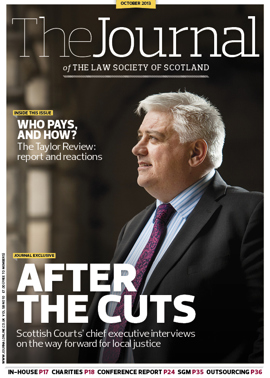Room at the top?

Should in-house lawyers be on their organisations’ boards? Are in-house lawyers valued by their organisations? The In-house Lawyers Group (ILG) and its sponsors asked these and other questions of ILG members in a survey ahead of this year’s annual conference, held on the theme “In-house in 2013: innovative, in the know and in demand”.
The results give an interesting insight into the reality of working in-house in 2013 and the role of today’s in-house lawyer (IHL).
In-housers as leaders
95% think lawyers should be on the board or equivalent, BUT 45% of IHLs have no personal aspirations to do so.
The good news is that some IHLs are already on the board of their organisation, or of another in a non-executive capacity.
Comments on why lawyers should be on the board included: “Lawyers have excellent training and analytical skills that can really be of benefit to a board”; they “bring a different focus… longer-term thinkers… the right candidate strikes the right balance between risk taking and risk embracing”. One IHL said: “Strategic decisions benefit from legal input”, and another that having a lawyer on the board “enhances due diligence and compliance for businesses”.
One comment said: “More in-house lawyers should take up wider strategic roles”. ILG completely agrees!
Skills an in-house lawyer needs to secure a place on the board are: (1) decision making; (2) influencing; (3) interpersonal; (4) communication; and (5) problem solving. IHLs feel they need most training on (2).
Commercial or “political” awareness, an understanding of the business, risk management, a can-do attitude, wider skills/knowledge, and charisma were also seen as being important to get to the top.
Value, demand and costs
Over 82% of IHLs feel their/their legal team’s work is valued by their employer organisation. However, this is still clearly seen as an ongoing challenge and hot topic.
Internal marketing of solicitors, communication, relationships and avoiding being regarded as an obstacle/hindrance, are seen as key. One IHL is working on the challenge of “breaking out of traditional mindsets” to get the business to understand that lawyers are not “execution focused scribes of decisions already taken”, but in fact have “the ability to make a full contribution to business strategy”.
IHLs are clearly working hard to demonstrate their value, including by:
1. Doing a good job: quickly and in a commercial way;
2. Intelligent reporting and measurement: frequent, structured and numbers-based reporting on financial savings achieved/value added and measuring against key performance indicators;
3. Controlling financial spend: reducing external legal spend, being demonstrably cheaper than outsourcing to external solicitors, working within budget;
4. Visibility and relationship management: ensuring senior people see the work IHLs do and building relationships internally, e.g. stakeholder meetings to demonstrate value-add or internal training to show the cost of mistakes;
5. Risk management and offering business solutions: identifying and mitigating risk, offering options and stressing the importance of IHLs being involved in a project early; and
6. Proper communication: and learning from feedback.
In the last year over 66% of IHLs have seen demand for internal legal services increase while demand for external legal services has either stayed the same or in some cases increased as well; 14% are not having all of their practising certificate fee paid by their employers; and almost 5% are not having any of it paid, which is a serious issue.
Hot topics and realities
Just over half (55%) of organisations have carried out strategic planning on the Scottish independence referendum.
This is significantly up from around 11% last year, but still seems low. Issues IHLs have identified with the referendum are specific to things like financial services regulation, energy policy, UK-registered intellectual property, planning, and housing priorities. One pointed out the need for “more clarity and certainty” over how the referendum could affect an organisation headquartered in Scotland. Others are waiting for the Scottish Government’s white paper.
Due to the cost of resolving a dispute, 82% of IHLs have advised an organisation to accept a compromise that does not reflect a fair outcome.
IHLs would also like to see greater efficiency in the dispute resolution process, better up-front fee arrangements with external counsel, and ADR or mediation.
The next generation
Over 42% of organisations offer no opportunities for the next generation of lawyers.
Around a third of IHL employers offer legal work experience and/or secondments for private practice trainees or lawyers. Less than a third (30%) offer traineeships and only a quarter offer law student placements. As ILG asked at Journal, September 2013, 34, is it time for in-house legal teams to grow their own?
What you want from ILG
IHLs would like ILG to provide more networking opportunities, online CPD and soft skills training.
This helps to verify some of ILG’s priorities, including its work to establish ILG regional and sectoral networks (starting with a “North East ILG” pilot event in October in Aberdeen), and ILG/Update plans to provide more online and soft skills training for IHLs in 2013-14.
The ILG Conference on 4 October provided much more food for thought around all of these topics. See the November Journal for highlights!
In this issue
- Jewel in the crown, or just red tape?
- In the public interest
- Sweeney: room for manoeuvre
- Lost in translation?
- EU Fundamental Rights Agency: the missing link?
- Reading for pleasure
- Opinion column: Stephen Gold
- Book reviews
- Profile
- President's column
- FM officially opens new MBH
- Feeling the squeeze
- Litigation: a numbers game
- Mythbusting! The in-house IT top ten
- Charities and the changing legal landscape
- Heir finding: the sensitive side
- Sign up to boost charity giving
- Law, but not as we know it
- All the permutations
- The truth, the whole truth...
- Shale gas: a complex process
- Expenses up to date?
- Scottish Solicitors' Discipline Tribunal
- Room at the top?
- Here comes the flood?
- SGM decision kills "sep rep"
- Outsourcing: the straight and narrow
- How not to win business: a guide for professionals
- Properly engaged?
- Ask Ash
- Sep rep: what now?
- From the Brussels office
- Law reform roundup






